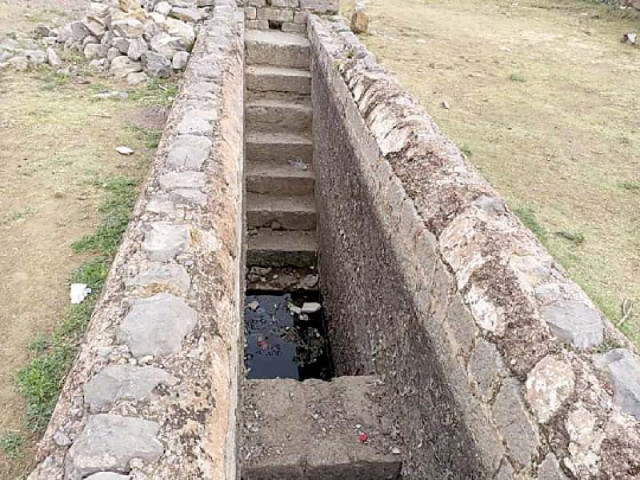Call for preserving Suri-era stepwell
Expert asks district admin to impose Section 144 to ban construction

The Khyber Pakhtunkhwa Department of Archeology has advised the district administration to impose Section 144, banning construction and excavation activities to safeguard the 16th-century Sher Shah Suri-era ‘Baoli’ step well.
The Archeology Department's Hazara Division Field Officer Syed Gul Kailash made this recommendation during a visit to the site in Shah Allah Ditta, situated on the Margalla Hills near Kanthala, a suburb of Khanpur.
Haripur Additional Deputy Commissioner Imran Khan Jadoon, Khanpur Assistant Commissioner Sikandar Khan, and Site Supervisor Raja Adnan also accompanied her.
The well and other relics found at the site date back to the era of Sher Shah Suri, a significant period in history. To protect this archaeological site, Syed Gul Kailash proposed the implementation of Section 144, effectively halting new constructions in the area. Furthermore, she suggested that the Finance Department transfer ownership of the site to the Archeology Department of Khanpur.
The step well was built by the known ruler of the subcontinent, Sher Shah Suri, in the 16th Century. He built similar structures on every route that his army followed. The Baoli was the source of fresh water not only for humans but also animals. It was built in a way that animals as big as elephants could go down to drink water directly from the well. The diameter of the well is 20 feet and the stairs go down 210 feet.
Highlighting the cultural heritage of the region, Syed Gul Kailash emphasised the responsibility of both the department and citizens in preserving these valuable artefacts. The area is known for its historical significance, encompassing the Buddhist period in Khanpur, Taxila, and Bhamala.
Illegal excavations have been a cause for concern, with numerous individuals apprehended by the police for attempting to extract antiquities or relocate them without notifying the archaeology department. Local residents frequently engage in unauthorised digging for personal purposes, such as building homes, constructing fences, or cultivating pastures. Often, ancient coins from bygone eras are unearthed, and individuals may attempt to sell them illegally, avoiding the scrutiny of the archaeology department.
Acknowledging the importance of safeguarding historical sites, the provincial government has been actively involved in their preservation.
These sites attract thousands of visitors, including followers of Buddhism and other religions from overseas, who come to perform their religious rituals. Hazara, with its rich historical background, holds immense significance in this regard.
Published in The Express Tribune, July 2nd, 2023.



















COMMENTS
Comments are moderated and generally will be posted if they are on-topic and not abusive.
For more information, please see our Comments FAQ